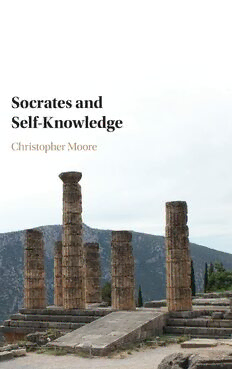
Socrates and Self-Knowledge PDF
Preview Socrates and Self-Knowledge
Socrates and Self-Knowledge In this book, the first systematic study of Socrates’ reflections on self-knowledge, Christopher Moore examines the ancient precept “Know yourself” and, drawing on Plato, Aristophanes, Xenophon, and others, reconstructs and reassesses the arguments about self-examination, per- sonal ideals, and moral maturity at the heart of the Socratic project. What has been thought to be a purely epistemological or metaphysical inquiry turns out to be deeply ethical, intellectual, and social. Knowing yourself is more than attending to your beliefs, discerning the structure of your soul, or recognizing your ignorance – it is constituting yourself as a self who can be guided by knowledge toward the good life. This is neither a wholly introspective nor a completely isolated pursuit: we know and constitute ourselves best through dialogue with friends and critics. This rich and ori- ginal study will be of interest to researchers in the philosophy of Socrates, selfhood, and ancient thought. Christopher Moore is Assistant Professor of Philosophy and Classics at The Pennsylvania State University. He is the author of many essays in edited volumes and journals, including American Journal of Philology, Ancient Philosophy, Apeiron, British Journal for the History of Philosophy, and Classical Quarterly. Socrates and Self-Knowledge Christopher Moore University Printing House, Cambridge CB2 8BS, United Kingdom Cambridge University Press is part of the University of Cambridge. It furthers the University’s mission by disseminating knowledge in the pursuit of education, learning and research at the highest international levels of excellence. www.cambridge.org Information on this title: www.cambridge.org/9781107123304 © Christopher Moore 2015 This publication is in copyright. Subject to statutory exception and to the provisions of relevant collective licensing agreements, no reproduction of any part may take place without the written permission of Cambridge University Press. First published 2015 A catalogue record for this publication is available from the British Library Library of Congress Cataloguing in Publication data Moore, Christopher, 1981– Socrates and self-knowledge / Christopher Moore. pages cm Includes bibliographical references and index. ISBN 978-1-107-12330-4 (hardback) 1. Socrates 2. Self (Philosophy) 3. Self-knowledge, Theory of. 4. Philosophy, Ancient. I. Title. B317.M67 2015 183ʹ.2–dc23 2015014245 ISBN 978-1-107-12330-4 Hardback Cambridge University Press has no responsibility for the persistence or accuracy of URLs for external or third-party internet websites referred to in this publication, and does not guarantee that any content on such websites is, or will remain, accurate or appropriate. To the memory of Leah K. Horowitz ἐστι καὶ χαλεπώτατον, ὥσπερ καὶ τῶν σοφῶν τινες εἰρήκασιν, τὸ γνῶναι αὑτόν, καὶ ἥδιστον … ὥσπερ οὖν ὅταν θέλωμεν αὐτοὶ αὑτῶν τὸ πρόσωπον ἰδεῖν, εἰς τὸ κάτοπτρον ἐμβλέψαντες εἴδομεν, ὁμοίως καὶ ὅταν αὐτοὶ αὑτοὺς βουληθῶμεν γνῶναι, εἰς τὸν φίλον ἰδόντες γνωρίσαιμεν ἄν. Aristotle Full souls are double mirrors, making still An endless vista of fair things before Repeating things behind George Eliot Contents Preface page ix The promise of self-knowledge ix A “Socratic” account x A response to the “Know yourself” xiii Acknowledgments xvi 1 Introduction: Socrates and the precept “Know yourself” 1 The benefits of studying Socrates and self-knowledge 1 Some theses about Socratic self-knowledge 4 Witnesses to the historical Socrates’ interest in the “Know yourself” 6 The earliest witnesses to the challenge “Know yourself” 14 The Delphic inscription 22 Some common but dismissive views of Socratic self-knowledge 31 Some sympathetic views of Socratic self-knowledge 34 Self-knowledge and self-constitution 36 What one knows when knowing oneself 40 Knowing oneself and knowing another 43 Sôphrosunê and self-knowledge 44 Non-Socratic self-knowledge 45 Structure of the book 47 2 Charmides: on impossibility and uselessness 54 Two problems with self-knowledge 54 Critias and the Delphic inscription 60 Ways of knowing oneself 71 Two obstacles to self-knowledge 84 Conclusion 99 3 Alcibiades: mirrors of the soul 101 New problems 101 Knowing one’s desires 108 vii viii Contents Knowing selfhood 110 Knowing oneself as a knower 114 A young man’s coming to know himself 131 Conclusion 135 4 Phaedrus: less conceited than Typhon 136 Alcibiades and Phaedrus 136 Four puzzles 141 A parallel practice 156 Conclusion 181 5 Philebus: pleasure and unification 185 Pictures of useless and useful self-knowledge in three dialogues 185 A prelude about reflexivity and pleasure 189 Debaters’ puzzles about unity and selfhood 193 Realizing one’s pleasures 196 Comedy and self-ignorance 209 Self-knowledge, unification, and the choiceworthy life 214 6 Xenophon’s Memorabilia 4.2: owning yourself 216 A reputedly impoverished picture 216 A dialogue about self-knowledge 217 Knowing yourself as knowing your powers 218 Problems with the “knowing your powers” view 221 Knowing yourself as knowing about justice 222 Knowing yourself as coming to own yourself 225 The benefits of self-knowledge and conversation 228 Knowing yourself as knowing the good 232 Socratic indirection 233 Conclusion 234 7 Conclusion: challenges and a defense 236 The unambiguous benefits of self-knowledge in the Rival Lovers 236 Overturning the gnôthi sauton in the Hipparchus 239 The modern Hipparchan attitude toward “knowing yourself” 244 An apology for Socratic self-knowledge 247 Bibliography 249 Index 267
